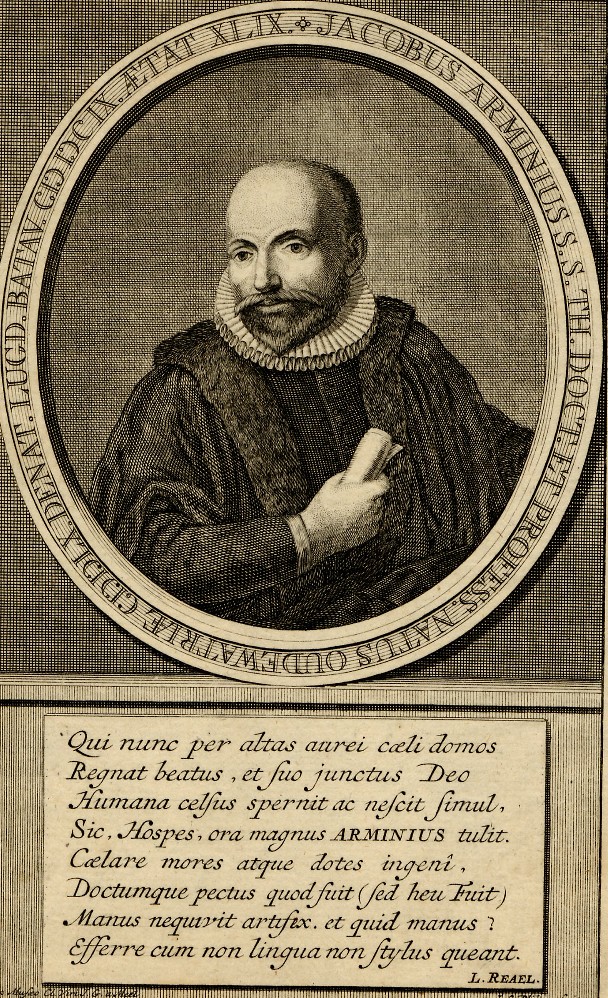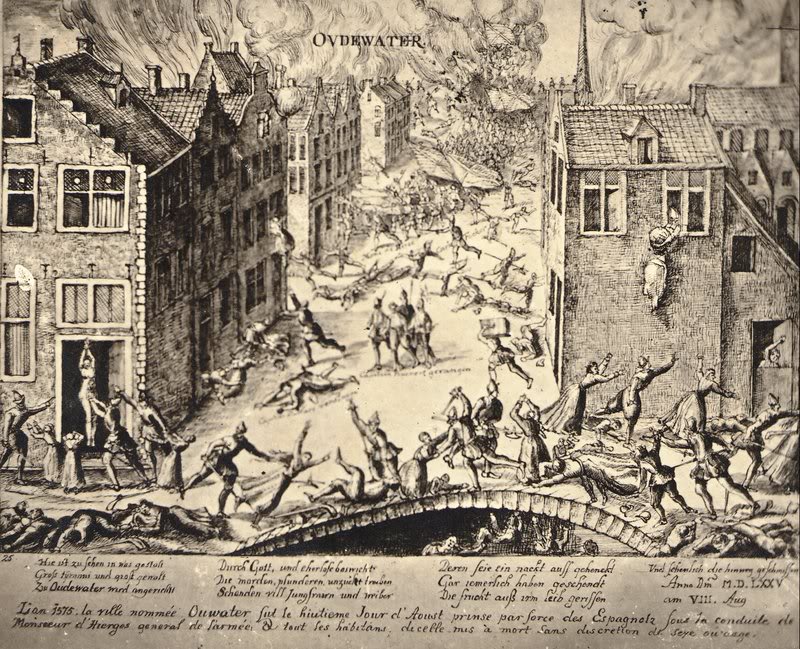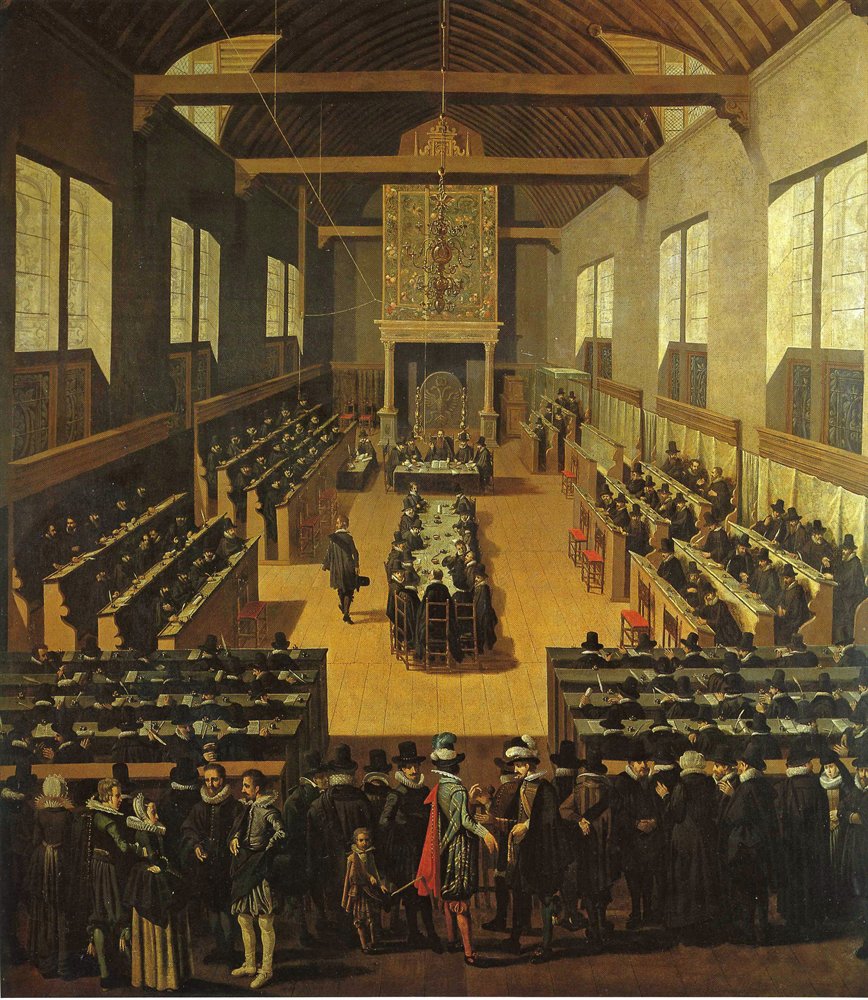|
Jacobus Arminius
Jacobus Arminius (10 October 1560 – 19 October 1609), the Latinized name of Jakob Hermanszoon, was a Dutch theologian during the Protestant Reformation period whose views became the basis of Arminianism and the Dutch Remonstrant movement. He served from 1603 as professor in theology at the University of Leiden and wrote many books and treatises on theology. Following his death, his challenge to the Reformed standard, the ''Belgic Confession'', provoked ample discussion at the Synod of Dort, which crafted the five points of Calvinism in response to Arminius's teaching. Early life Arminius, was born in 1559 or 1560 in Oudewater, Utrecht. He became an orphan while still young. His father Herman, a manufacturer of weapons, died, leaving his wife a widow with small children. He never knew his father, and his mother was killed during the Spanish massacre at Oudewater in 1575. The child was adopted by Theodorus Aemilius, a priest inclined towards Protestantism. Around 1572 ( ... [...More Info...] [...Related Items...] OR: [Wikipedia] [Google] [Baidu] |
David Bailly
David Bailly (1584–1657) was a Dutch Golden Age painter. Biography Bailly was born at Leyden in the Dutch Republic, the son of a Flemish immigrant, calligrapher and fencing master, Peter Bailly. As a draftsman, David was pupil of his father and the copper engraver Jacques de Gheyn. David Bailly apprenticed with a surgeon-painter Adriaan Verburg in Leiden and then with Cornelius van der Voort, a portrait painter in Amsterdam. According to Houbraken, in the winter of 1608, Bailly took his Grand Tour, travelling to Frankfurt, Nuremberg, Augsburg Hamburg, and via Tirol to Venice, and from there to Rome. On his return he spent five months in Venice, all the while working as a journeyman where he could, before crossing the alps again in 1609. On his return voyage, Bailly worked for several German princes including the Duke of Brunswick. Upon his return to the Netherlands in 1613, Bailly began painting still-life subjects and portraits, including self-portraits and ... [...More Info...] [...Related Items...] OR: [Wikipedia] [Google] [Baidu] |
Remonstrant
The Remonstrants (or the Remonstrant Brotherhood) is a Protestant movement that had split from the Dutch Reformed Church in the early 17th century. The early Remonstrants supported Jacobus Arminius, and after his death, continued to maintain his original views called Arminianism against the proponents of Calvinism. Condemned by the synod of Dort (1618–19), the Remonstrants remained in a small minority in the Netherlands. In the middle of the 19th century, the Remonstrant Brotherhood was influenced by the liberal Dutch theological movement. History Foundation In formulating Arminianism, Jacobus Arminius disagreed with Calvin, especially on predestination. He defended free examination as superior to the doctrines of established churches. In 1610, Arminius followers presented to the States of Holland and Friesland the ''Five Articles of Remonstrance'' formulating their points of disagreement with Calvinism as adopted by the Dutch Reformed Church. Supporters of Arminius were c ... [...More Info...] [...Related Items...] OR: [Wikipedia] [Google] [Baidu] |
Marburg
Marburg ( or ) is a university town in the German federal state (''Bundesland'') of Hesse, capital of the Marburg-Biedenkopf district (''Landkreis''). The town area spreads along the valley of the river Lahn and has a population of approximately 76,000. Having been awarded town privileges in 1222, Marburg served as capital of the landgraviate of Hessen-Marburg during periods of the fifteenth to seventeenth centuries. The University of Marburg was founded in 1527 and dominates the public life in the town to this day. Marburg is a historic centre of the pharmaceutical industry in Germany, and there is a plant in the town (by BioNTech) to produce vaccines to tackle Covid-19. History Founding and early history Like many settlements, Marburg developed at the crossroads of two important early medieval highways: the trade route linking Cologne and Prague and the trade route from the North Sea to the Alps and on to Italy, the former crossing the river Lahn here. A fi ... [...More Info...] [...Related Items...] OR: [Wikipedia] [Google] [Baidu] |
Rudolph Snellius
Rudolph Snel van Royen (5 October 1546 – 2 March 1613), Latinized as Rudolph Snellius, was a Dutch linguist and mathematician who held appointments at the University of Marburg and the University of Leiden. Snellius was an influence on some of the leading political and intellectual forces of the Dutch Golden Age. Life Rudolph Snel van Royen was born on 5 October 1546 in Oudewater. Born to a wealthy family in Episcopal principality of Utrecht while this province was under the dominion of the emperor Charles V, Rudolf Snel grew up in the city of Oudewater. At maturity he left to study at the University of Cologne under Valentin Naboth and at the University of Heidelberg under Immanuel Tremellius and soon received a teaching position at the University of Marburg. Though trained in Aristotelian logic, he had become impressed with the new logic of Petrus Ramus, which he taught along with mathematics and languages at his university posts. In 1578, he returned to Oudewater ... [...More Info...] [...Related Items...] OR: [Wikipedia] [Google] [Baidu] |
Utrecht
Utrecht ( , , ) is the fourth-largest city and a municipality of the Netherlands, capital and most populous city of the province of Utrecht. It is located in the eastern corner of the Randstad conurbation, in the very centre of mainland Netherlands, about 35 km south east of the capital Amsterdam and 45 km north east of Rotterdam. It has a population of 361,966 as of 1 December 2021. Utrecht's ancient city centre features many buildings and structures, several dating as far back as the High Middle Ages. It has been the religious centre of the Netherlands since the 8th century. It was the most important city in the Netherlands until the Dutch Golden Age, when it was surpassed by Amsterdam as the country's cultural centre and most populous city. Utrecht is home to Utrecht University, the largest university in the Netherlands, as well as several other institutions of higher education. Due to its central position within the country, it is an important hub for both rail and road t ... [...More Info...] [...Related Items...] OR: [Wikipedia] [Google] [Baidu] |
Protestantism
Protestantism is a Christian denomination, branch of Christianity that follows the theological tenets of the Reformation, Protestant Reformation, a movement that began seeking to reform the Catholic Church from within in the 16th century against what its followers perceived to be growing Criticism of the Catholic Church, errors, abuses, and discrepancies within it. Protestantism emphasizes the Christian believer's justification by God in faith alone (') rather than by a combination of faith with good works as in Catholicism; the teaching that Salvation in Christianity, salvation comes by Grace in Christianity, divine grace or "unmerited favor" only ('); the Universal priesthood, priesthood of all faithful believers in the Church; and the ''sola scriptura'' ("scripture alone") that posits the Bible as the sole infallible source of authority for Christian faith and practice. Most Protestants, with the exception of Anglo-Papalism, reject the Catholic doctrine of papal supremacy, ... [...More Info...] [...Related Items...] OR: [Wikipedia] [Google] [Baidu] |
Theodorus Aemilius
Theodoros or Theodorus ( el, Θεόδωρος) is a masculine given name, from which Theodore is derived. The feminine version is Theodora. It may refer to: Ancient world :''Ordered chronologically'' * Theodorus of Samos, 6th-century BC Greek sculptor, architect and inventor * Theodorus of Cyrene, 5th-century BC Libyan Greek mathematician * Theodorus of Byzantium, late 5th-century BC Greek sophist and orator * Theodorus the Atheist (c. 340–c. 250 BC), Libyan Greek philosopher * Theodorus of Athamania (), King of a tribe in Epirus * Theodorus (meridarch) (), civil governor of the Swat province of the Indo-Greek kingdom * Theodorus of Gadara, 1st-century BC Greek rhetorician * Theodorus of Asine (), Greek Neoplatonist philosopher * Theodorus of Tabennese (c. 314–368), Egyptian Christian monk * Theodorus (usurper) (), Roman usurper against Emperor Valens * Theodorus Priscianus, 4th-century physician at Constantinople * Theodorus I (bishop of Milan) (died 490) * Th ... [...More Info...] [...Related Items...] OR: [Wikipedia] [Google] [Baidu] |
Siege Of Oudewater (1575)
The siege of Oudewater was an event during the Eighty Years' War that took place in the Dutch town of Oudewater, culminating in the Oudewater Massacre ( ''Oudewaterse moord''). The siege by Spanish troops started on 19 July 1575 and ended on 7 August 1575, when the town was taken by storm and plundered. Background In 1568 a garrison of the Spanish Army was stationed in Oudewater. On 19 June 1572 Adriaen van Swieten, a nobleman and deputy of William of Orange, entered the town with a small number of troops and convinced it to join the Dutch Revolt against Philip II of Spain. Siege and massacre The siege by Spanish troops under command of stadtholder Gillis van Berlaymont Gilles van Berlaymont (c. 1545 – 18 June 1579 in Maastricht) was stadtholder for the Spanish Crown of Drenthe, Friesland, Groningen and Overijssel (1572-1573), stadtholder of Guelders (1572–1577), substitute stadtholder of Holland, Zeelan ... started on 19 July 1575 and ended in a bloodbath on 7 ... [...More Info...] [...Related Items...] OR: [Wikipedia] [Google] [Baidu] |
Utrecht (province)
Utrecht (), officially the Province of Utrecht ( nl, Provincie Utrecht, link=no), is a Provinces of the Netherlands, province of the Netherlands. It is located in the centre of the country, bordering the Eemmeer in the north-east, the province of Gelderland in the east and south-east, the province of South Holland in the west and south-west and the province of North Holland in the north-west and north. The province of Utrecht has a population of 1,353,596 as of November 2019. It has a land area of approximately . Apart from its Utrecht, eponymous capital, major cities and towns in the province are Amersfoort, Houten, IJsselstein, Nieuwegein, Veenendaal and Zeist. The busiest railway station in the Netherlands, Utrecht Centraal railway station, Utrecht Centraal, is located in the province of Utrecht. History The Bishopric of Utrecht was established in 695 when Saint Willibrord was consecrated bishop of the Frisians at Rome by Pope Sergius I. With the consent of the Franks, Fr ... [...More Info...] [...Related Items...] OR: [Wikipedia] [Google] [Baidu] |
Five Points Of Calvinism
Calvinism (also called the Reformed Tradition, Reformed Protestantism, Reformed Christianity, or simply Reformed) is a major branch of Protestantism that follows the theological tradition and forms of Christian practice set down by John Calvin and other Reformation-era theologians. It emphasizes the sovereignty of God and the authority of the Bible. Calvinists broke from the Roman Catholic Church in the 16th century. Calvinists differ from Lutherans (another major branch of the Reformation) on the spiritual real presence of Christ in the Lord's Supper, theories of worship, the purpose and meaning of baptism, and the use of God's law for believers, among other points. The label ''Calvinism'' can be misleading, because the religious tradition it denotes has always been diverse, with a wide range of influences rather than a single founder; however, almost all of them drew heavily from the writings of Augustine of Hippo twelve hundred years prior to the Reformation. The na ... [...More Info...] [...Related Items...] OR: [Wikipedia] [Google] [Baidu] |
Synod Of Dort
The Synod of Dort (also known as the Synod of Dordt or the Synod of Dordrecht) was an international Synod held in Dordrecht in 1618–1619, by the Dutch Reformed Church, to settle a divisive controversy caused by the rise of Arminianism. The first meeting was on 13 November 1618 and the final meeting, the 180th, was on 29 May 1619. Voting representatives from eight foreign Reformed churches were also invited. ''Dort'' was a contemporary Dutch term for the town of ''Dordrecht'' (and it remains the local colloquial pronunciation). In 2014, the first entire critical edition of the Acts and Documents of the Synod was published. Background There had been previous provincial synods of Dort, and a National Synod in 1578. For that reason the 1618 meeting is sometimes called the ''Second Synod of Dort''. The acts of the Synod were tied to political intrigues that arose during the Twelve Years' Truce, a pause in the Dutch war with Spain. After the death of Jacob Arminius his follow ... [...More Info...] [...Related Items...] OR: [Wikipedia] [Google] [Baidu] |



.jpg)


